As loving pet owners, we often want to share our meals with our furry companions. However, many common human foods can be detrimental, even toxic, to dogs. Understanding which foods are safe and which to avoid is crucial for their well-being. This guide provides a comprehensive overview of human foods that dogs can and cannot eat, drawing from veterinary expertise to ensure your dog’s safety.
Why Certain Foods Are Toxic to Dogs
The fundamental reason some human foods are toxic to dogs lies in their distinct digestive and metabolic systems compared to ours. Dogs process certain substances differently, leading to a buildup of harmful compounds or an inability to break them down effectively.
For instance, theobromine and caffeine, found in chocolate, are metabolized much slower by dogs. This delay can cause these substances to accumulate in their system rapidly, potentially leading to fatal consequences. Similarly, while the fleshy part of cherries is safe, their pits, stems, and leaves contain cyanide. Ingesting large quantities of these parts can be dangerous, and the pits themselves can pose a physical obstruction in the digestive tract.
The toxicity of certain foods can also be influenced by a dog’s size, breed, and overall health condition. Therefore, consulting with a veterinarian is always recommended if you have any doubts about a particular food item.
Foods Dogs Cannot Eat
Many everyday human foods pose a significant risk to dogs, ranging from mild upset to severe poisoning. It’s vital to be aware of these common culprits:
1. Alcohol
Alcohol is highly toxic to dogs due to their smaller body size and differing metabolism. Even small amounts can cause serious harm, leading to vomiting, breathing difficulties, coma, and even death.
2. Apple, Apricot, Cherry, and Plum Seeds/Pits
While the flesh of apples is safe, their seeds and cores contain cyanide. Similarly, the pits of apricots, cherries, peaches, and plums also contain cyanide and can cause digestive issues.
3. Avocado
Avocados contain persin, which can cause vomiting and diarrhea in dogs. The pit also presents a choking hazard and can cause intestinal obstruction.
4. Broccoli
In large quantities, broccoli can be harmful due to compounds called isothiocyanates. The stalks can also pose a choking risk.
5. Caffeine and Coffee Grounds
Caffeine, found in coffee, tea, and some sodas, contains methylxanthines that can cause significant health problems, including seizures and irregular heart rhythms.
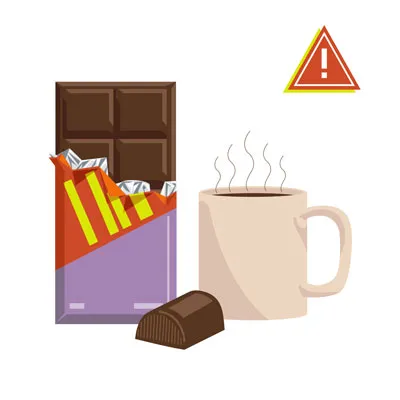 Chocolate
Chocolate
6. Chocolate
Chocolate is one of the most notorious toxic foods for dogs. It contains theobromine and caffeine, which dogs cannot metabolize efficiently. Dark chocolate and baker’s chocolate are particularly dangerous. Symptoms include hyperactivity, vomiting, diarrhea, pancreatitis, abnormal heart rhythm, and seizures.
7. Grapes and Raisins
These fruits are highly toxic and can cause sudden kidney failure in dogs, even in small amounts. Symptoms include vomiting, diarrhea, loss of appetite, and changes in urination.
8. Macadamia Nuts, Almonds, and Pistachios
Macadamia nuts can cause weakness, vomiting, and tremors. Other nuts like almonds and pistachios can be choking hazards or problematic if seasoned.
9. Milk and Dairy Products
Many dogs are lactose intolerant and can experience digestive upset, such as gas and diarrhea, from milk and dairy products. High-fat dairy like ice cream can also lead to pancreatitis.
10. Mushrooms
Wild mushrooms can be highly toxic, causing a range of symptoms from vomiting to organ failure. It’s best to avoid all mushrooms unless specifically identified as safe by an expert.
11. Nutmeg and Cinnamon
Nutmeg can cause hallucinations and severe vomiting. Cinnamon can irritate a dog’s mouth and potentially lead to low blood sugar.
12. Onions, Garlic, Chives, and Leeks
These allium family members contain compounds that can damage red blood cells and cause anemia in dogs. Onion and garlic powders found in many processed foods are also dangerous.
13. Salt
Excessive salt intake can disrupt a dog’s fluid balance, leading to symptoms like tremors, seizures, and even coma.
14. Spicy Food
Spicy foods can cause digestive upset, including vomiting, stomach ulcers, and diarrhea.
15. Sugar-Free Gum and Candy (Xylitol)
Xylitol, an artificial sweetener, is extremely toxic to dogs. It can cause a rapid drop in blood sugar, leading to seizures and liver failure. Even a small amount can be fatal.
16. Tomatoes and Raw Potatoes
The green parts of tomato plants and unripe tomatoes contain solanine, which is toxic. Raw potatoes also contain solanine.
17. Tobacco
Nicotine in tobacco products is poisonous to dogs, causing symptoms like vomiting, diarrhea, rapid breathing, tremors, and seizures.
18. Yeast and Raw Dough
Raw dough can expand in a dog’s stomach, causing severe pain and potential rupture. The yeast also produces alcohol, leading to alcohol poisoning.
19. Raw Meat
Raw or undercooked meat can contain harmful bacteria like Salmonella and E. coli, posing a risk of foodborne illness to dogs.
20. Rhubarb and Star Fruit
These contain soluble calcium oxalate crystals, which can lead to kidney damage and other severe health issues.
21. Flavored Water and Seltzer Water
These beverages can contain added sugars, artificial sweeteners, or other ingredients that are unsafe for dogs. Stick to plain, fresh water.
Foods Safe for Dogs
Fortunately, many human foods are safe and even beneficial for dogs when given in moderation.
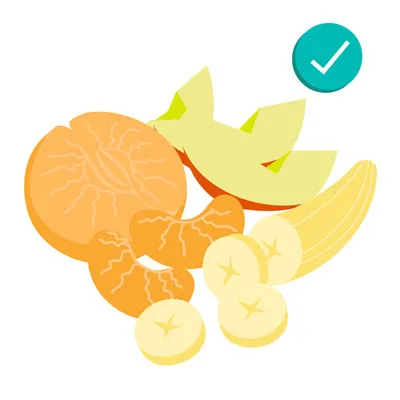 Apples, Oranges, & Bananas
Apples, Oranges, & Bananas
1. Apples, Oranges, and Bananas
Apples (without core and seeds), oranges (in moderation), and bananas (without peel) are safe and provide vitamins and fiber.
2. Blueberries and Blackberries
These berries are packed with antioxidants, fiber, and vitamins, making them a healthy treat.
3. Cantaloupe, Mango, Peaches, Pears, Pineapples, and Watermelon
These fruits are safe in moderation, provided seeds, pits, and rinds are removed to prevent choking hazards.
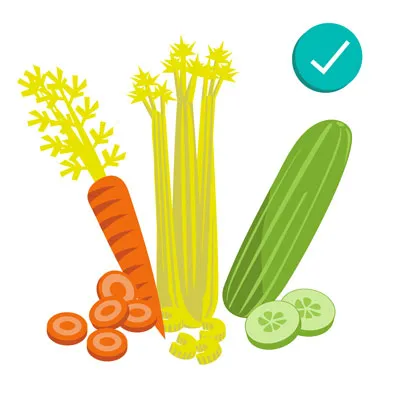 Carrots, Cucumber, and Celery
Carrots, Cucumber, and Celery
4. Carrots, Cucumber, and Celery
These low-calorie vegetables are excellent for overweight dogs and provide crunch and essential nutrients.
5. Cheese
Small amounts of low-fat cheese can be a safe treat for dogs who are not lactose intolerant.
6. Eggs
Fully cooked eggs are a great source of protein and can help soothe an upset stomach.
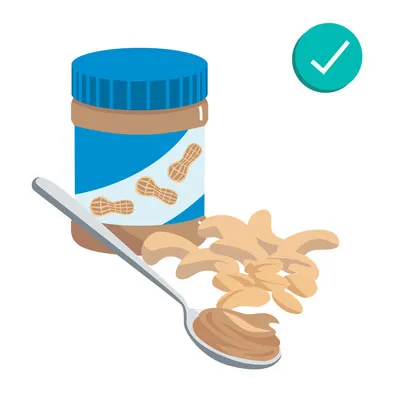 Peanuts, Peanut Butter, and Cashews
Peanuts, Peanut Butter, and Cashews
7. Peanuts, Peanut Butter, and Cashews
Given in small quantities and without added salt or xylitol, these offer protein and healthy fats.
8. Popcorn and Corn
Plain, air-popped popcorn (no butter or salt) and corn (off the cob) can be safe treats.
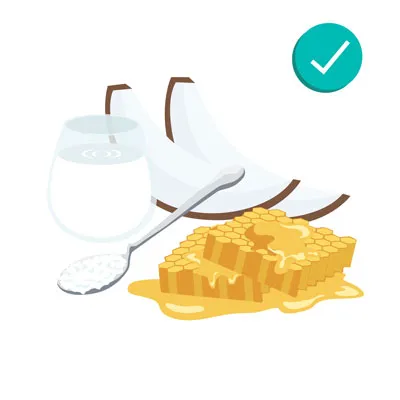 Coconut and Honey
Coconut and Honey
9. Coconut and Honey
In small amounts, coconut (milk, oil) and honey can provide health benefits.
10. Shrimp and Fish
Plain, fully cooked shrimp and boneless fish like salmon and sardines are good sources of protein.
11. Turkey
Plain, cooked turkey meat without skin, fat, or bones is a lean protein source.
12. Grains, Wheat, and Quinoa
In moderation, these can be part of a balanced diet for dogs.
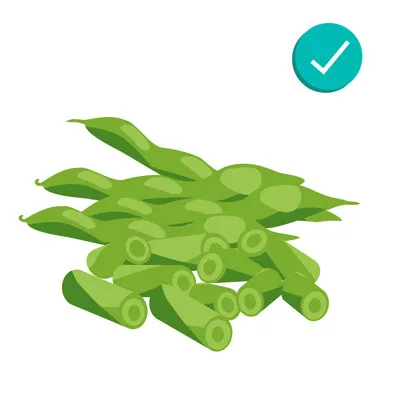 Green beans
Green beans
13. Green beans
Steamed or raw green beans are a low-calorie, healthy treat.
Dogs Most at Risk
While all dogs should be protected from toxic foods, certain groups are more vulnerable:
- Small breeds: Due to their lower body weight, they are more susceptible to poisoning from smaller amounts of toxins.
- Puppies: Their developing systems are more sensitive to harmful substances.
- Elderly dogs: They may have underlying health conditions that increase their risk.
- Dogs with pre-existing conditions: Illnesses like diabetes or kidney disease can make dogs more susceptible to food toxicity.
Preventing Accidental Ingestion
Preventing your dog from eating toxic foods involves a combination of vigilance and proper storage:
- Store foods out of reach: Keep all potentially harmful foods on high shelves or in locked cabinets.
- Avoid feeding from your plate: This encourages begging and makes it harder to control what your dog eats. Offer dog-specific treats instead.
- Educate household members and guests: Ensure everyone understands the importance of not sharing human food with your dog.
- Be extra cautious during holidays: Busy periods can lead to lapses in attention.
What to Do if Your Dog Eats Something Toxic
If you suspect your dog has ingested a toxic food, act immediately:
- Call your veterinarian or poison control center: Prompt professional intervention is critical for successful treatment.
- Provide details: Be ready to share the type of food, amount consumed, and time of ingestion.
- Follow veterinary advice: Do not attempt home remedies unless specifically instructed by a veterinarian, as some actions, like inducing vomiting, can be harmful in certain situations.
Staying informed and vigilant is key to ensuring your dog’s health and safety. By understanding the risks associated with human foods, you can provide a safer and happier life for your beloved canine companion.
